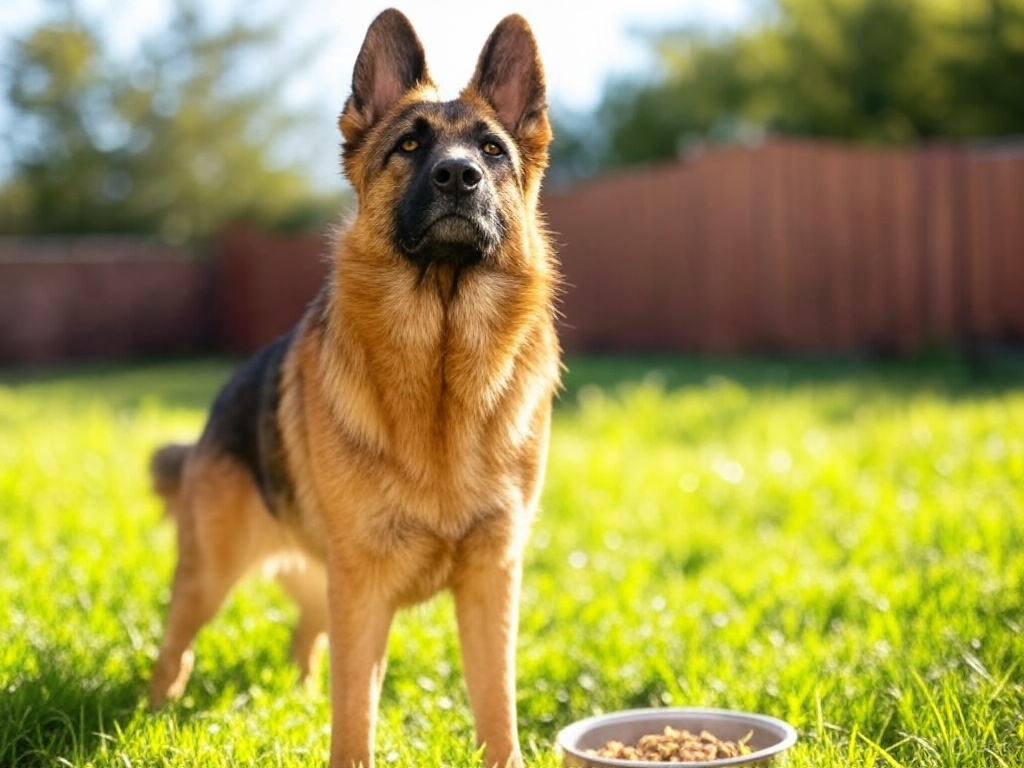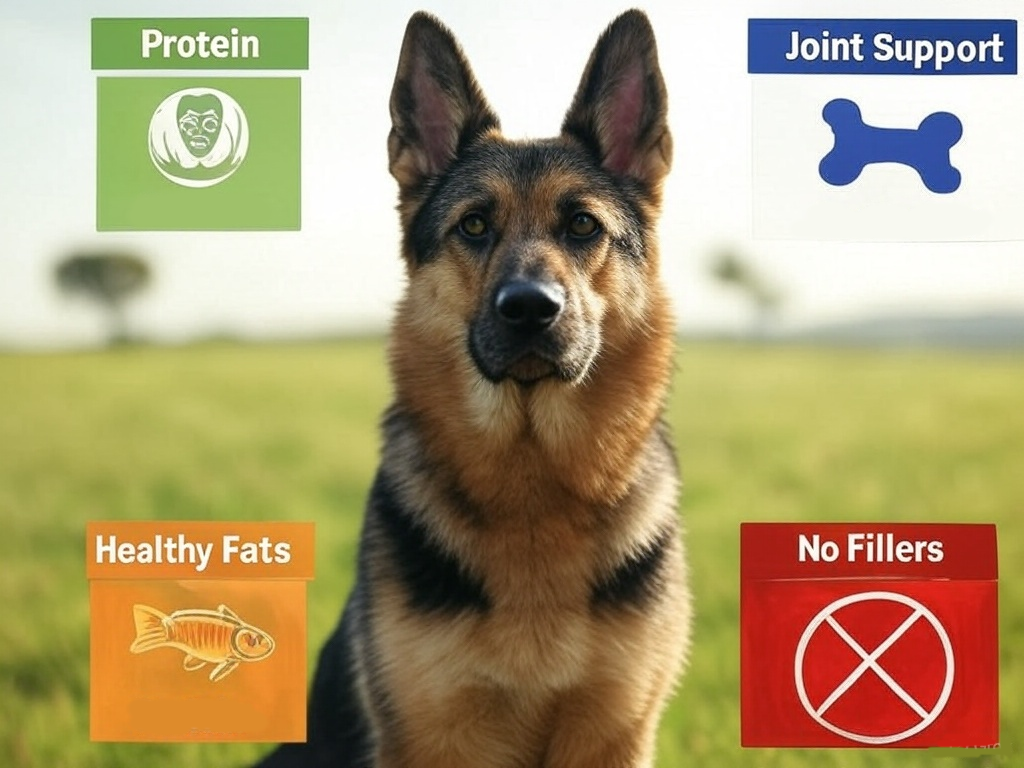
Table of Contents
- Why the Right Diet Matters for German Shepherds
- Essential Nutrients in the Best Food for German Shepherds
- Diet for Every German Shepherd Life Stage
- Mistakes to Avoid in German Shepherd Feeding
- Final Thoughts
- References
Why the Right Diet Matters for German Shepherds

German Shepherds are big, active dogs weighing 50 to 90 pounds. Therefore, they need the best food for German Shepherds to match their energy. In addition, proper food keeps muscles strong, coats shiny, and joints healthy.
However, poor choices can lead to weight gain or joint problems. For instance, these issues worsen conditions like hip dysplasia in German Shepherds—learn more here. Additionally, proper feeding improves digestion and enhances vitality. In essence, the right diet does more than just fill their bowl—it promotes long-term health.
Essential Nutrients in the Best Food for German Shepherds

Top Nutrients to Prioritize
- Protein: Protein helps develop strong muscles, so target 20-30% from sources like chicken, beef, or fish. For instance, chicken is a lean option, while salmon provides omega fatty acids. However, some German Shepherds may have allergies to beef or chicken, leading to itching or digestive issues. In such cases, opt for alternatives like turkey, duck, or venison. Additionally, make sure the food label lists named meats as the primary ingredient for better quality.
- Joint Support: Omega-3s, glucosamine, and chondroitin protect German Shepherd joint health. This breed often faces hip dysplasia. Consequently, these nutrients reduce inflammation and support joints. However, if fish oil isn’t an option due to allergies, use flaxseed oil instead.
- Healthy Fats: Fats such as fish oil or chicken fat (10-15%) provide energy and maintain a shiny coat for German Shepherds. Since this breed sheds heavily, these fats also support healthy skin. For dogs allergic to chicken, coconut oil is a great alternative. Additionally, steer clear of vague “animal fat” labels to ensure quality.
- No Fillers: Avoid corn, soy, and artificial additives, as they can upset stomachs and provide empty calories. Since German Shepherds often have sensitive digestion, opt for whole grains like rice or grain-free alternatives such as sweet potatoes when necessary.
Diet for Every German Shepherd Life Stage

German Shepherds’ nutrition changes with age. Specifically, their energy, growth, and health needs shift. For example, here’s how to find the best food for German Shepherds at each stage:
Puppy Stage
Puppies (Up to 1 Year): Puppies grow fast, building muscle and bone. Use a formula with 25-30% protein from chicken or fish, plus 1-1.5% calcium. However, don’t overfeed—extra calories strain joints. In addition, large-breed puppy food balances growth. Add DHA for brain health. Then, switch to adult food slowly at 10-12 months.
Adult Stage
Adults (1-6 Years): Active adults need 20-25% protein and 10-15% fat. Turkey or salmon work well. Plus, joint support like glucosamine is key for hip health. Meanwhile, feed twice daily, adjusting for activity. If allergies arise, hypoallergenic options help.
Senior Stage
Seniors (7+ Years): Seniors need less fat (8-12%) and more fiber (4-6%). Use digestible proteins like egg. For instance, glucosamine and antioxidants aid joints and vitality. In addition, smaller meals help digestion. Also, soft food suits older teeth.
Mistakes to Avoid in German Shepherd Feeding

- Overfeeding: Too much food causes weight gain. This stresses German Shepherd joint health, worsening hip dysplasia.1 A 70-pound adult needs 1,200-1,800 calories daily. For example, overfeeding by 20% adds fat fast. Plus, it raises bloat risk.2 Therefore, measure portions and limit treats to 10% of calories.
- Cheap Food: Low-cost food uses fillers like corn or soy. These lack nutrients and upset stomachs.3 In addition, artificial additives can harm health. Instead, choose AAFCO-approved food with real meat first.
- Ignoring Allergies: Allergies to grains or chicken cause itching or ear infections in 10-15% of German Shepherds.4 First, test with a vet and switch to duck or venison diets. Then, transition slowly over 7-10 days.
- Wrong Life Stage: Adult food for puppies stunts growth.5 Meanwhile, puppy food for seniors adds weight. So, match food to age—puppy, adult, or senior formulas—for balance.
Avoid these errors for a healthy diet. Ultimately, the best food for German Shepherds fits their needs. Accordingly, adjust with vet advice for success.
Final Thoughts
The best food for German Shepherds boosts their energy and health. Specifically, focus on protein, joint support, and fats, tailored to age. Meanwhile, avoid mistakes for their well-being.
Additionally, learn more about managing hip dysplasia in this guide or explore effective training techniques in this post to keep your German Shepherd thriving. What feeding tips have worked for your dog? Share your experiences in the comments below!
References
- American Kennel Club. How much to feed your dog. https://www.akc.org/expert-advice/nutrition/how-much-to-feed-your-dog/. Accessed March 29, 2025.
- Glickman LT, Glickman NW, Pérez CM, et al. Analysis of risk factors for gastric dilatation and dilatation-volvulus in dogs. J Am Vet Med Assoc. 1994;204(9):1465-1471. https://www.ncbi.nlm.nih.gov/pmc/articles/PMC1742058/.
- Association of American Feed Control Officials. Understanding pet food. https://www.aafco.org/consumers/understanding-pet-food/. Accessed March 29, 2025.
- Veterinary Dermatology Clinic. Food allergies in dogs: what you need to know. https://www.vetdermclinic.com/food-allergies-in-dogs-what-you-need-to-know/. Accessed March 29, 2025.
- VCA Animal Hospitals. Feeding large-breed puppies. https://vcahospitals.com/know-your-pet/feeding-large-breed-puppies/. Accessed March 29, 2025.
- PetMD. Feeding Your Adult German Shepherd. https://www.petmd.com/dog/nutrition/healthy-foods-checklist-german-shepherds. Accessed March 15, 2025.

Great advice 👍